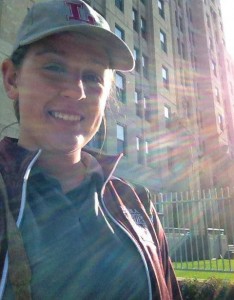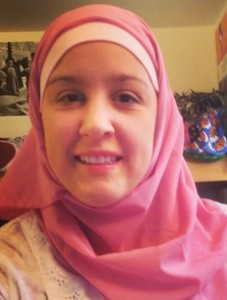As a student Tour Guide, I have grown quite comfortable talking about my school and its resources, life as a student in Chicago, and about my experiences as an International Studies major and Arabic Language and Culture minor. However, I never imagined my studies in Arabic would become relevant to my work. I had the opportunity to participate in Hijab for a Day on campus last spring semester. During this day, students from all faith and cultural backgrounds pledged to spend a day wearing a hijab, the traditional head scarf worn by Muslim women, for a full 24 hours. This included not only my full day’s course load, but also my commute between Loyola’s Water Tower and Lake Shore campuses, orchestra rehearsal, and a 10AM tour!
I was a little nervous to perform a tour in a hijab, since it is not a normal part of my attire. I wondered what the families might think. I explained to them about the event and how it raises awareness for Muslim Students Association. It also sparked questions about other faith groups on campus and about the religious culture here at Loyola. It was beautiful to see families take to my experience and become truly interested in what makes Loyola unique as a religious and academic institution.
Then again this fall, I was able to take lessons from my Arabic minor and apply them to my work as a tour guide! The admissions department was offered the opportunity to welcome two visiting professors from Qatar, an Arab country, and show them around Loyola’s campus. I volunteered, hoping to use some of my Arabic conversation skills that I have acquired over three semesters of study. I combed by textbook looking for any and every word that would relate to our campus: buildings, academic programs, locations, prepositions. I tried to piece together an explanation of our campus using the tools I had to work with.
While I didn’t have the opportunity to give the professors a full tour, I was introduced to them and I was able to explain—bil lughat Arabiya—that I was a student here at Loyola studying Arabic, hoping to travel to Morocco and become a teacher. Now, as I finish my semester and prepare to leave for Maghreb, Morocco, in 7 weeks I am thankful for the opportunities I have had both in the classroom and outside of it to practice my Arabic and to engage not only with the language but also with the culture of the Arab world.


